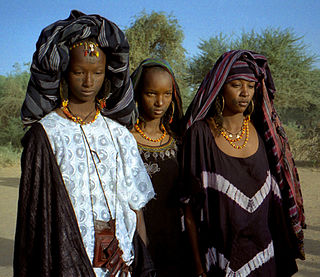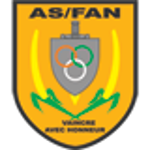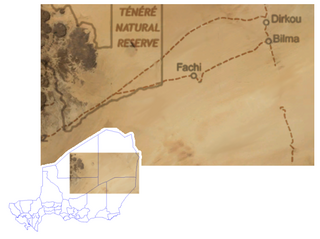
This article is about the demographic features of the population of Niger, including population density, ethnicity, education level, health of the populace, economic status, religious affiliations and other aspects of the population.

The economy of Niger is based largely upon internal markets, subsistence agriculture, and the export of raw commodities: foodstuffs to neighbors and raw minerals to world markets. Niger, a landlocked West African nation that straddles the Sahel, has consistently been ranked on the bottom of the Human development index, with a relatively low GDP and per capital income. Economic activity centres on subsistence agriculture, animal husbandry, re-export trade, and export of uranium. The 50% devaluation of the West African CFA franc in January 1994 boosted exports of livestock, cowpeas, onions, and the products of Niger's small cotton industry. Exports of cattle to neighboring Nigeria, as well as Groundnuts and their oil remain the primary non-mineral exports. The government relies on bilateral and multilateral aid – which was suspended briefly following coups d'état in 1996 and 1999 – for operating expenses and public investment. Short-term prospects depend on continued World Bank and IMF debt relief and extended aid. The post 1999 government has broadly adhered to privatisation and market deregulation plans instituted by these funders.

The Niger River is the principal river of West Africa, extending about 4,180 km (2,600 mi). Its drainage basin is 2,117,700 km2 (817,600 sq mi) in area. Its source is in the Guinea Highlands in southeastern Guinea. It runs in a crescent through Mali, Niger, on the border with Benin and then through Nigeria, discharging through a massive delta, known as the Niger Delta or the Oil Rivers, into the Gulf of Guinea in the Atlantic Ocean. The Niger is the third-longest river in Africa, exceeded only by the Nile and the Congo River. Its main tributary is the Benue River.

Benue–Congo is a major subdivision of the Niger–Congo language family which covers most of Sub-Saharan Africa. It consists of two main branches: the Central Nigerian languages, spoken mostly in Nigeria, and the Bantoid–Cross languages, spoken in Nigeria, Cameroon and most of Sub-Saharan Africa, since they contain the Bantu languages.
The Niger national football team represents Niger in international association football through the Nigerien Football Federation, a member of Confederation of African Football (CAF). Niger plays in the colors of the flag of Niger, white, green and orange. Their nickname comes from the Dama gazelle, native to Niger, the Hausa name of which is Meyna or Ménas The Dama appears on their badge in the colors of the national flag.

Niger or Niger State is a state in Central Nigeria and the largest state in the country. The state capital is Minna, and other major cities are Bida, Kontagora, and Suleja. It was formed in 1976 when the then North-Western State was bifurcated into Niger State and Sokoto State. It is home to Ibrahim Babangida and Abdulsalami Abubakar, two of Nigeria's former military rulers. The Nupe, Gbagyi, Kamuku, Kambari, Dukawa, Hausa and Koro form the majority of numerous indigenous tribes of Niger State.
Berry Aviation is an American charter airline based in San Marcos, Texas, United States. It was established and started operations in 1983 and operates charter passenger and cargo flights as well as work for the US Postal Service. Its main base is San Marcos Municipal Airport.

Asaba is a city strategically located on a hill at the western edge of the Niger River, overlooking its sister city, Onitsha, across the Niger Bridge. It is the capital of Delta State Nigeria. A fast developing urban area, Asaba had a population of 149,603 as at the 2006 census, and a metropolitan population of over half a million people.

Bayelsa is a state in southern Nigeria in the core Niger Delta region, between Delta State and Rivers State. Its capital is Yenagoa. The main language spoken is Ijaw with dialects such as Kolukuma, Mein, Bomu, Nembe, Epie-Atisa, and Ogbia. Like the rest of Nigeria, English is the official language. The state was formed in 1996 from part of Rivers State and is thus one of the newest states of the Nigerian federation.

Diori Hamani International Airport is an airport in Niamey, the capital of Niger. It is located 9 km from Niamey in the south eastern suburbs of the city, along the Route Nationale 1, the major highway linking Niamey with the east of the nation. The airport complex also includes the major base for the Armed Forces of Niger's "Armee d'Air".

Niger–United States relations are bilateral relations between Niger and the United States.

Association Sportive des Forces Armées Nigériennes or simply AS FAN is a Nigerien football club based in Niamey and operated by the Nigerien Armed Forces. They play at the stade du camp Bagagi Iya, a small stadium in one of Niamey's military bases, although larger matches are played at the stade Général Seyni Kountché. Their current club president is Army Lieutenant Colonel Djibrilla Hima Hamidou.

Dirkou is a town in the Bilma Department, Agadez Region of north-eastern Niger. It lies in the northern Kaouar escarpment, a north-south line of cliffs which form an isolated oasis in the Sahara desert. As of 2011, the commune had a total population of 14,998 people.

The Ministry of Foreign Affairs, Cooperation and African Integration of the Government of Niger is the government authority responsible for the foreign relations of Niger and its diplomatic corps abroad. The Foreign Ministry is headed by the Minister of Foreign Affairs, a political appointment who sits in the Council of Ministers of Niger, reporting directly to the President of Niger. The reference to "African Integration" speaks to the Minister's role in the African Union and its long professed Pan-African project on continental integration. The current Minister is Ibrahim Yacouba, who has held the post since 2016.
Prostitution in Niger is illegal but common in the cities, near mines and around military bases. UNAIDS estimate there are 46,630 sex workers in the country. Many have turned to prostitution because of poverty.

The Tongo Tongo ambush or simply the Niger ambush occurred on 4 October 2017, when armed militants from the Islamic State in the Greater Sahara (ISGS) attacked Nigerien and U.S. soldiers outside the village of Tongo Tongo, Niger while they were returning to base after a stop in the village. During the ambush, five Nigeriens, four Americans, and at least 21 ISGS militants were killed and eight Nigeriens and two Americans including the team commander were wounded. In the days preceding the ambush, the Nigerien and U.S. soldiers conducted a mission attempting to locate and capture or kill Doundou Chefou, a commander in the ISGS.

The 2017 Ayorou attack occurred on 21 October 2017 when armed militants attacked a Nigerien military outpost in the village of Ayorou in southwestern Niger, killing 13 gendarmes. Occurring just weeks after a similar attack in the area killed four American and four Nigerien troops, the attack was carried out by gunmen who crossed the porous border from Mali. At dawn, militants in 4-5 vehicles and motorcycles and armed with machine guns and rocket launchers attacked paramilitary policemen in Ayorou, a small town on the banks of the Niger River 200 kilometers northwest of Niamey. Thirteen gendarmes were killed and five others were wounded. At least one of the attackers was killed as well. The attackers fled after police reinforcements arrived and pursued them to the border. A similar raid was carried out on the same outpost the previous May.














